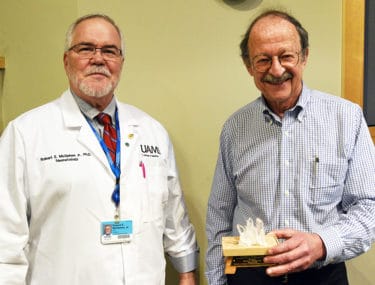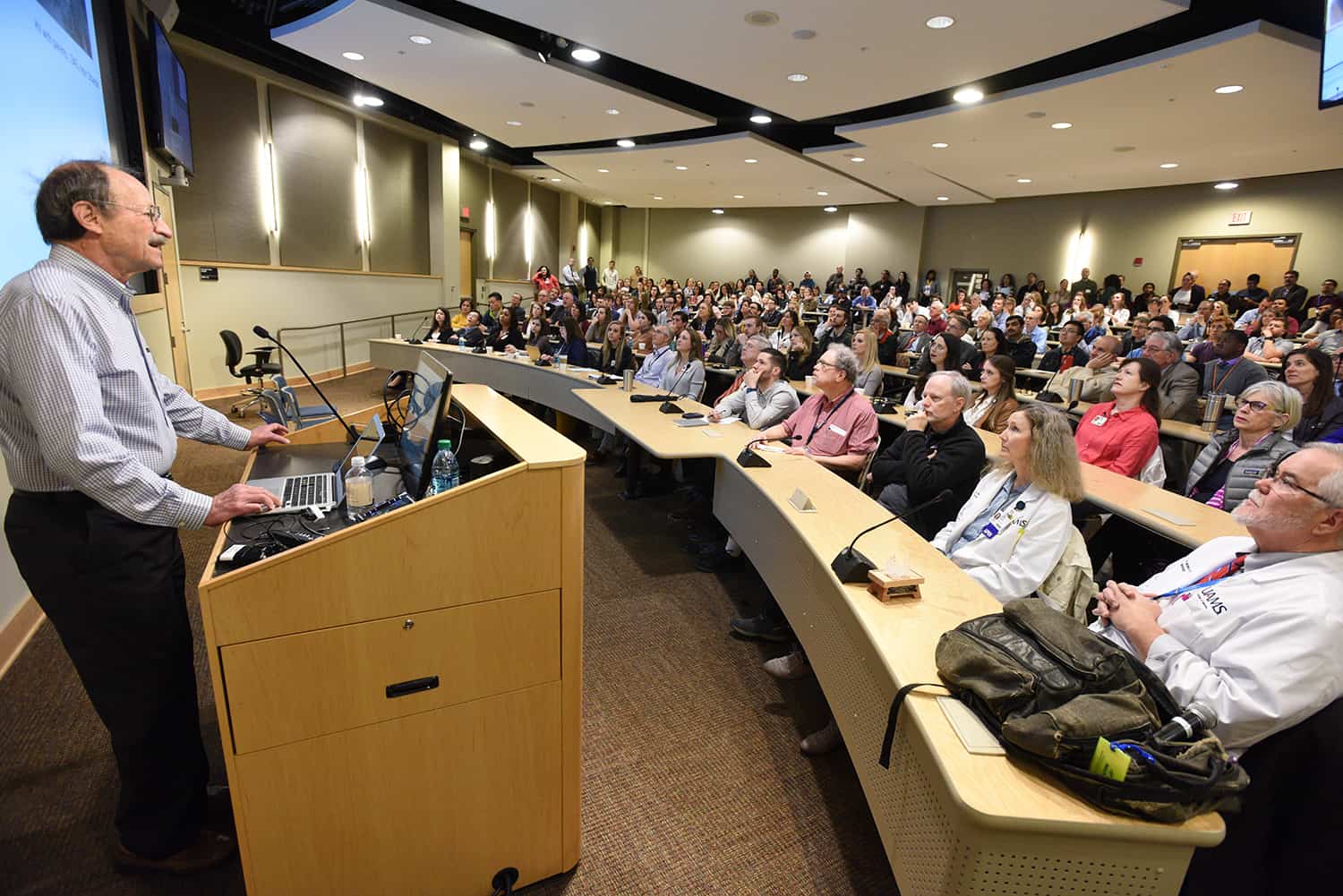Nobel Laureate Says Teamwork, Relationships, Social Involvement Vital for Scientists
| Science is about relationships, Nobel laureate Harold Varmus, M.D., told the standing-room-only crowd at Student Research Day. The work is collegial, the results are meant to be shared, and its discoveries are inseparably linked to a wider social and political context.
“Science is not a solitary activity, it’s a team sport,” Varmus said, noting that his groundbreaking research in retroviruses and cancer involved a group of scientists and staff, including J. Michael Bishop, M.D., with whom he shared the Nobel prize in 1989.
“Our team was integral in everything that we achieved and part of the joy of being a scientist. So this notion that science locks you up in a room by yourself until you figure out the problem and announce it to the world — that’s obviously a myth.”

UAMS Graduate School Dean Robert E. McGehee Jr., Ph.D., left, thanks speaker Harold Varmus, M.D., with a gift of quartz crystal from Arkansas.
Varmus gave the Robert E. McGehee Jr., Ph.D., Distinguished Lectureship in Biomedical Research to kick off the UAMS Graduate School’s annual Student Research Day. Throughout the day, more than 150 students gave poster and oral presentations.
In addition to his research career, Varmus served as director of the National Institutes of Health (NIH) from 1993-1999 and as director of the National Cancer Institute (NCI) from 2010-2015. He told the young researchers that, although they may not be thinking about it now, someday they will realize how much science depends on community support. Every scientist should find a way to be of service and facilitate that relationship, he said.
Varmus encouraged the students to not stay on the sidelines politically. Many researchers would rather “just stay out of it,” he said, but that’s not possible. Science is never free of politics because science serves society, while science also depends on society, he said. They are interlinked.
Additionally, Varmus noted that science is inherently international, displaying a group photo of the Varmus Lab from 2005. The majority of those pictured were born outside of the United States, and the rest were either the children or grandchildren of immigrants. Varmus’ parents were Jewish and from Eastern Europe.
“Immigration is inherent in our culture of science,” Varmus said. “In the U.S., a quarter of the members of the National Academy of Sciences were born in other countries.”
Varmus encouraged the students in the audience to share their future scientific discoveries widely and freely, both in the name of advancing collective knowledge and to repay a debt to society, which has invested in their careers through donations and taxes. He said he was proud of his work at the NIH to create PubMed Central, a free source for full-text scholarly articles, and has continued to promote the open and free sharing of scientific research on the Web.
Varmus continues to do research to this day. He is the Lewis Thomas University Professor and Senior Adviser to the Dean and Provost at Weill Cornell Medical Center in New York, and left Arkansas shortly after his presentation to fly back in time to lecture to his students.
He continues to explore the original question that motivated his Nobel-winning work: How do normal cells turn into cancer? Varmus’ research from the ‘70s laid the groundwork for a host of modern cancer treatments. Today, his work focuses on types of small-cell lung cancers that have proven unresponsive to those methods.
“Science, despite its difficulties, despite its heartbreaks, is still something that unites and inspires us,” Varmus said. “And tells us something about what it means to be living on this peanut of a planet, somewhere out in nowhere, and tells us more about who we are and what our chances are of improving our fate.”
Students, faculty, staff and the public crowded into the 300-seat ground floor auditorium in the I. Dodd Wilson Education Building for the March 12 talk, with the overflow standing shoulder-to-shoulder along the walls and crowding into the doorways for the hour-long presentation. The talk was broadcast live to the building’s identical auditorium upstairs and to the Northwest Arkansas Regional Campus.
“If it looks like I’m about to explode with excitement, I am,” said McGehee, who is dean of the UAMS Graduate School and namesake for the distinguished lecture. “This is an incredible turnout.”
McGehee highlighted the anonymous family who donated the funds to establish the distinguished lectureship. Like Varmus, he emphasized the mutual relationship between science and society, and how donors, volunteers and public servants can make a difference.
“Without the benefactors who give very generously to UAMS, a lot of things around here wouldn’t happen,” McGehee said.
